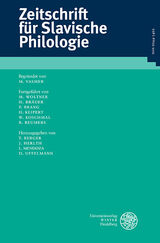Autor: Barbara Sonnenhauser
- «
- 1
- »
Die Suche erzielte 3 Treffer.
Relativization Strategies in Slavic: Diversity in Unity Editorial
Sprachliche Strukturen, narrative Strategien. Zum funktionalen Sprachwandel im vorstandardisierten Balkanslavischen am Beispiel der Vita der Petka Tărnovska und des ‚Sbornik‘ von Pop Punčo Beitrag
- «
- 1
- »
